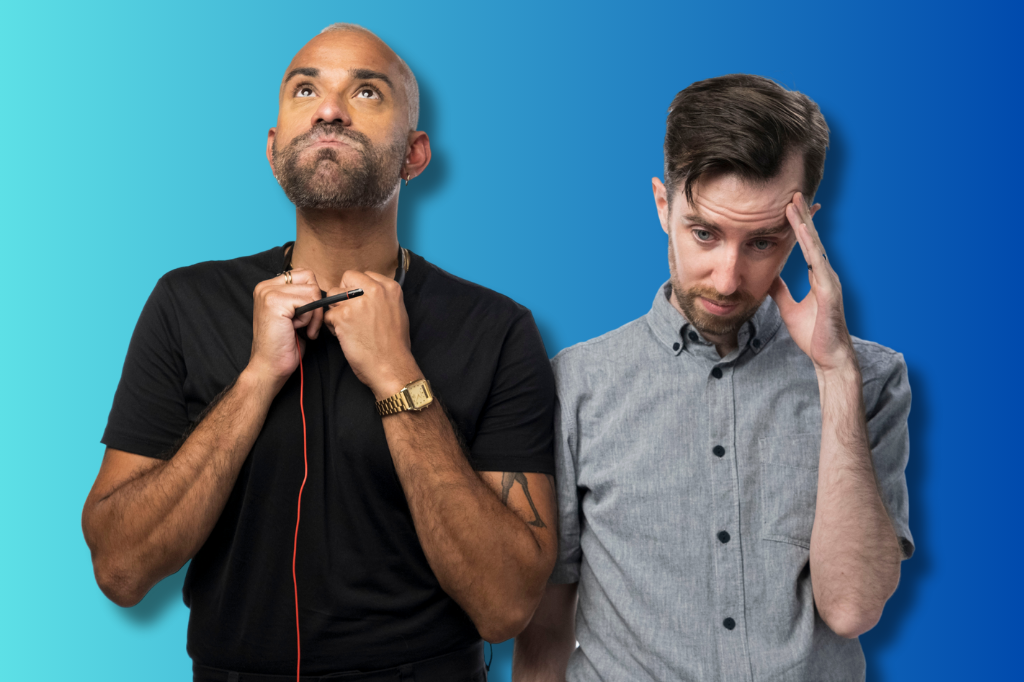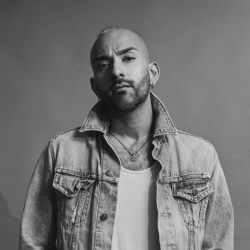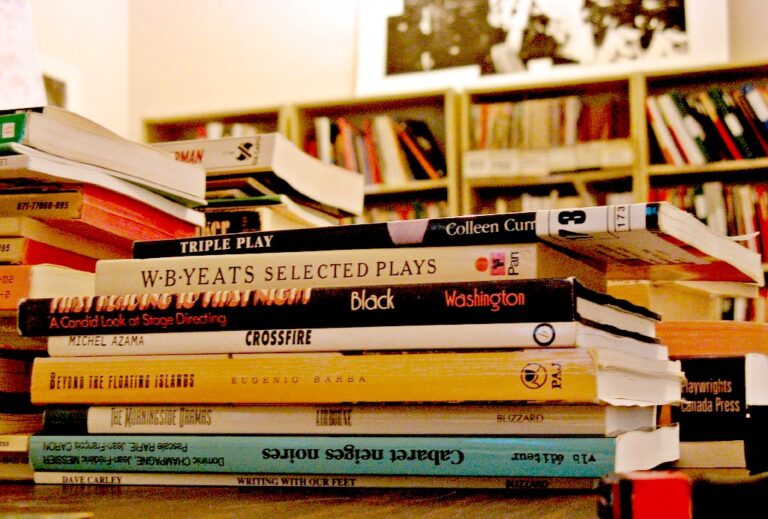Can audio dramas tell stories traditional theatre can’t?
Fifteen years ago, actor Qasim Khan and playwright Kevin Shea, both fresh out of school, accepted positions answering phones in the box office of a notable Toronto theatre. Their hilarious and occasionally harrowing experiences talking with the city’s audiences inspired Kevin to write the new fiction podcast Feedback, produced by the Toronto-based Cue6 Theatre. It stars Qasim as a customer service representative who spends the day talking with Valerie (Rosemary Dunsmore) and Martin (Tom McCamus), a married couple in the midst of a family crisis.
Kevin and Qasim reconnected in writing to talk about the unusual intimacy of phone calls, getting emotional with strangers on the job, and the potential for theatre artists to create something fresh in an emerging medium.
Kevin Shea (KS): Do you remember how it felt talking with customers all day on the phone? I remember it was initially nerve-racking. But you quickly go on autopilot.
Qasim Khan (QK): Oh God, do I ever.
I remember my first shift on the phones. There was this call with an older woman who was buying tickets to an opera and wanted to sit beside the composer. Our boss was listening, and chimed in (privately, so only I could hear him) to remind me it was illegal to say where this composer was sitting. I was so overwhelmed.
But you’re right: after that initial panic dissipates, it all becomes a vague puddle of interactions.
KS: The memories that remain involve people getting extremely emotional. Sometimes people would yell or plead right from the beginning of the call, which is intense when it’s right in your ear.
QK: I feel like I ended up having so many of those heated conversations. One Christmas Eve, a patron had missed a performance of a holiday show and wanted to exchange the ticket for something in the new year, which wasn’t allowed. He threatened to sue me and the theatre, and asked me to pass him on to the artistic director of the place so he could complain more. Merry fucking Christmas, Qasim!
KS: There were also intimate moments. I remember talking to an older man and confirming his wife’s name on the account. There was a pause before he said, quietly, “my wife died a few months ago.” I panicked about what to say next. It was such a sad, personal moment. Then he added, in the most upbeat way, “but I’ve got a new girlfriend, so put her name on the account instead.” That kind of emotional whiplash was common.
QK: That’s great. Yes, I learned way too much about some people. There was a woman going through a divorce who wanted to know when her (ex-)husband was coming to see a show so she could attend the same performance. He later called us to let us know he has a restraining order against her, so they should most definitely not be at the same performance. We had to take note of both their stories to avoid potential drama in the lobby.
KS: Feedback explores how we use our voices. Someone hearing you, Qasim, might assume you’re white or straight. But your name suggests you’re Muslim, which can come with all sorts of assumptions and prejudices.
Even outside our old phone job, you’ve told me how you adjust your register depending on how you think the person you’re speaking to might respond to a more queer affect. Your character Akbar has moments where he shifts his voice depending on who he’s talking with, and I think it’s so beautiful how you do those. How has your experience with code switching changed over the course of your life?
QK: It’s something I’ve practised all my life. I grew up in a really white suburb, and I knew that if it was easier for white people to understand me, it peeled off a layer of distance between me and them. So I was raised to speak politely and clearly.
The queer part of it came from meeting various boyfriends’ dads; I knew that suburban dads would be less put-off by their son dating a queer brown guy if I pitched my voice down a bit to sound “less gay.”
This was also the case while travelling. Existing in a post-9/11 world as a young brown guy with a Muslim name, I was the person airport security officers and border guards had their eye on. So, opposite to how I dealt with suburban dads, I would amp up my queerness while travelling. I would wear the GAYEST outfit and dig deep into the “hey girl, yas queen, werk” in me, so I was perceived as less of a threat.
I thought I was doing a public service by changing myself for others. What I realized was that — by trying to become neutral, or by putting on a false version of myself — I was slowly disappearing all the things that made me me. I have a different relationship to this stuff now — I have no trouble sounding like the jaded, anti-social queer person that I am today.
KS: I love that your version of heartwarming self-acceptance is not wanting to talk to anyone.
Akbar is a drag queen and a customer service rep. I picked those two jobs because I feel like many customer service roles in North America are a kind of corporate drag performance. Workers are asked to be artificially cheerful representatives of a brand, and that requires a level of exaggeration that, in a certain light, looks like parody. At the same time, genuine affection can develop for customers; that’s a big part of what happens with Akbar and Valerie. Did you draw on any warm experiences you had with customers?
QK: Absolutely. In my experience, there’s a level of trust that develops between cisgender straight women of a certain age and cisgender gay men. It could be the byproduct of a generation who’s watched Will & Grace, or Sex and the City — maybe that’s where the trope of gay men as trustworthy allies against straight men comes from?
In any case, I think that dynamic allows for an emotional exchange that’s pretty unique — and that’s exactly what happens with Akbar and Valerie in our series. If Akbar was straight, I don’t think Valerie would put her faith and trust in Akbar in the way she does; and, similarly, if Val was a straight man, I don’t think Akbar would feel as free as he ends up feeling with her.
KS: Fiction podcasts still feel a bit unsettled as a medium, but I think they possess so much potential as an art form distinct from radio plays and audiobooks. The use of narration and the episodic structure in Feedback allowed me to go much further with the story than I could in a traditional play. And because it’s available on the internet it has a much larger potential audience than any theatre production. There isn’t this brief window where people can experience it; there’s no such thing as a sold-out podcast.
All that said, I’m so grateful everyone involved had a background in theatre. We recorded all your scenes with Tom and Rosemary in the same room, and there’s an energy and chemistry you had together that elevates the performances. I’m curious if you had a similar experience, and what potential you see in theatre artists playing around with digital forms.
QK: I totally agree, Kevin. This particular audio project had the relationship dynamics and ensemble-feel of a theatre project, but also the artistic freedom of television or film. Working in a digital form allowed for some adjustments that wouldn’t work in theatre: there’s no stress to make moments larger than they need to be, since microphones allow for a different level of intimacy and nuance.
My personal experience was that this form felt more like a DIY craft than any theatre piece. Things felt less precious: we could do takes that were bad, takes that felt good, and then there’s options, versus throwing ourselves off the edge of a cliff with no looking back, the way theatre works!
KS: The challenge with making this kind of work is that there are no obvious sources of funding the way there are for Canadian theatre, film, and TV. We made Feedback with a Digital Now grant from the Canada Council for the Arts, but that was a one-time initiative offered during the COVID lockdowns. Many theatre companies made podcasts or other digital projects during that time because they had nothing else to do. But almost all of them have now returned exclusively to live performance. This is understandable, since the existing audience and donor bases for theatre are older and less likely to listen to podcasts. And, of course, a number of these companies own venues that need filling!
But the younger generation is much more digitally inclined — look at the success of CBC’s PlayME podcast, which translates Canadian stage plays into audio dramas. The sheer size of that demographic could be beneficial in growing a theatre company’s reputation and creating a complimentary source of revenue. Successful podcasts can also be adapted into stage shows, bringing those new audiences into the theatre. There’s no shortage of successful plays based on books — why not podcasts?
Feedback is available wherever you get your podcasts. More information is available here.











Comments